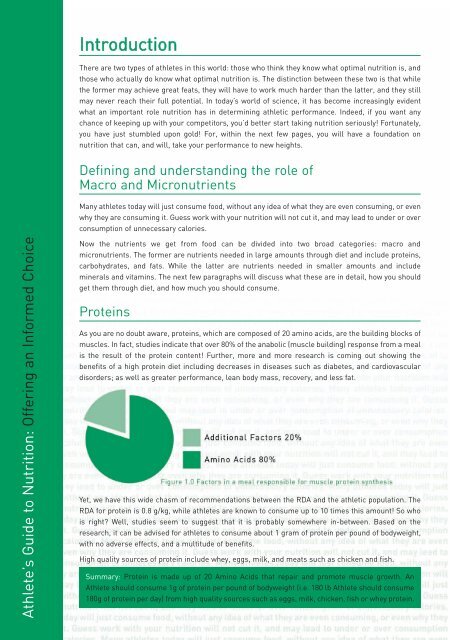1zRihoC
1zRihoC
1zRihoC
You also want an ePaper? Increase the reach of your titles
YUMPU automatically turns print PDFs into web optimized ePapers that Google loves.
Introduction<br />
There are two types of athletes in this world: those who think they know what optimal nutrition is, and<br />
those who actually do know what optimal nutrition is. The distinction between these two is that while<br />
the former may achieve great feats, they will have to work much harder than the latter, and they still<br />
may never reach their full potential. In today’s world of science, it has become increasingly evident<br />
what an important role nutrition has in determining athletic performance. Indeed, if you want any<br />
chance of keeping up with your competitors, you’d better start taking nutrition seriously! Fortunately,<br />
you have just stumbled upon gold! For, within the next few pages, you will have a foundation on<br />
nutrition that can, and will, take your performance to new heights.<br />
Defining and understanding the role of<br />
Macro and Micronutrients<br />
Many athletes today will just consume food, without any idea of what they are even consuming, or even<br />
why they are consuming it. Guess work with your nutrition will not cut it, and may lead to under or over<br />
consumption of unnecessary calories.<br />
Athlete’s Guide to Nutrition: Offering an Informed Choice<br />
Now the nutrients we get from food can be divided into two broad categories: macro and<br />
micronutrients. The former are nutrients needed in large amounts through diet and include proteins,<br />
carbohydrates, and fats. While the latter are nutrients needed in smaller amounts and include<br />
minerals and vitamins. The next few paragraphs will discuss what these are in detail, how you should<br />
get them through diet, and how much you should consume.<br />
Proteins<br />
As you are no doubt aware, proteins, which are composed of 20 amino acids, are the building blocks of<br />
muscles. In fact, studies indicate that over 80% of the anabolic (muscle building) response from a meal<br />
is the result of the protein content! Further, more and more research is coming out showing the<br />
benefits of a high protein diet including decreases in diseases such as diabetes, and cardiovascular<br />
disorders; as well as greater performance, lean body mass, recovery, and less fat.<br />
Yet, we have this wide chasm of recommendations between the RDA and the athletic population. The<br />
RDA for protein is 0.8 g/kg, while athletes are known to consume up to 10 times this amount! So who<br />
is right? Well, studies seem to suggest that it is probably somewhere in-between. Based on the<br />
research, it can be advised for athletes to consume about 1 gram of protein per pound of bodyweight,<br />
with no adverse effects, and a multitude of benefits.<br />
High quality sources of protein include whey, eggs, milk, and meats such as chicken and fish.<br />
Summary: Protein is made up of 20 Amino Acids that repair and promote muscle growth. An<br />
Athlete should consume 1g of protein per pound of bodyweight (i.e. 180 lb Athlete should consume<br />
180g of protein per day) from high quality sources such as eggs, milk, chicken, fish or whey protein.


